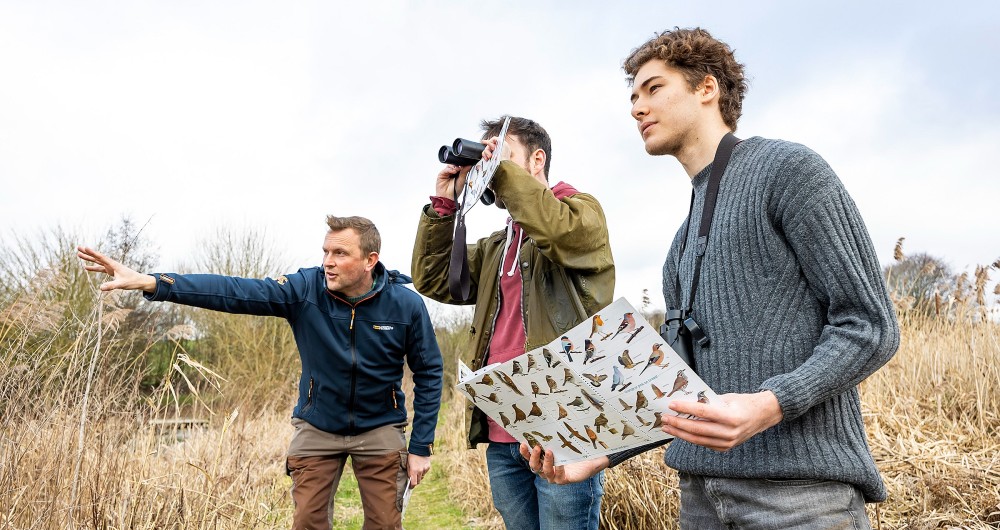
From early this morning (Friday 4 February) thousands of farmers, gamekeepers and land managers around the UK are setting off across their fields to count the farmland birds that share their land as part of the GWCT Big Farmland Bird Count 2022.
The annual citizen science project, organised by the Game & Wildlife Conservation Trust (GWCT) since 2014, asks land managers to spend half an hour checking in on their feathered friends, recording their numbers and submitting the results to the Trust. The aim is to encourage farmers and gamekeepers to support farmland birds and highlight the hard work already done by many of them to help reverse species’ declines. The count gives a vital national snapshot of the health of the UK’s birdlife.
“It is not too late to get involved,” said Dr Roger Draycott who organises the count. “Counting takes just 30 minutes and can be done anytime between now and 20 February. It is an opportunity for land managers to see the impact of their conservation efforts, encouraging them to do more even more. And it is a great way to demonstrate to the public and policy makers what can be achieved on the UK’s farms.
“Land managers look after 71% of the UK’s countryside – the largest songbird habitat in the country – so they can make a real and immediate difference by adopting effective conservation measures.”
Participation in the GWCT Big Farmland Bird Count reached record levels in 2021: 2,500 counts were returned (up from 1,500 in 2020), with counts being carried out across a massive 2.5million acres of England, Scotland, Wales and Northern Ireland (up from 1.4million acres in 2020). Organisers hope that even more people will get involved over the three weeks of this year’s count.
Minette Batters, president of the NFU, said:
“The NFU is extremely pleased to be again sponsoring the GWCT Big Farmland Bird Count – an event which perfectly highlights how farmers balance excellent conservation work on farms across the country alongside producing sustainable climate-friendly food.
“Last year saw a record number of people participate in the count. So, over the next three weeks I would encourage as many farmers as possible to pick up their binoculars and get involved.”
Joe Stanley, farming columnist, author and GWCT Head of Farming, Training & Partnerships, will be counting on the GWCT’s demonstration farm, the Allerton Project in Leicestershire. He said: “It’s really easy to take part and it’s a great way for us as farmers and land managers, not only to appreciate and understand the bird species on our farms, but also to demonstrate to the public the great work that we are doing to encourage those farmland birds, whether that’s through overwinter supplementary feeding or through planting winter bird seed mix or other environmental measures.”
Teyl de Bordes, an estate factor from Selkirk in the Scottish Borders, has been taking part since the count began in 2014. “We find it helps us gather data on the effect of over 20 years winter feeding of small farmland birds like the large mixed finch flocks,” he said. “The more farms take part the more valuable the data is.”
Explaining why she gets involved, Sarah Righton, who farms near Moreton-in-Marsh in Gloucestershire, said:
“We have a 300-acre mixed farm, livestock and arable, small fields, mature hedges, pond areas and we plant wild bird cover crops in the spring to provide food for the birds over winter. Taking part in the GWCT Big Farmland Bird Count is a great opportunity to get involved on a national scale. We can see if what we have been doing over the last 11 years has made a difference and it gives us a starting point for planning what we can do in the future. We’ve decided to invite our farm shop customers to come along and help us count this year.”
Leading agricultural college and university centre, Sparsholt College in Hampshire, is encouraging its land-based students to get involved. Dave Lock, Curriculum Leader for Land and Wildlife, commented: “The GWCT Big Farmland Bird Count is such a fantastic project to inspire our students with. As the farmers and gamekeepers of the future, they are passionate about the world around them and are keen to make a real difference. We can’t wait to monitor our populations across our countryside campus again this year and record the wide variety of species that call Sparsholt College their home.”
The GWCT Big Farmland Bird Count is sponsored by the National Farmers’ Union (NFU) and has the support of farming unions and organisations across the UK.
How to get involved
Taking part in the BFBC is easy. Just pick one day between 4-20 February, download a count sheet from www.bfbc.org.uk and spend 30 minutes recording the number and species of birds seen on one area of land. Then submit your results via the website.
Bird identification guides and videos are available at www.bfbc.org.uk, along with guidance on how to support birds on farmland.
